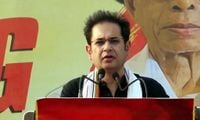Shillong: In the wake of the recent terrorist attack in Pahalgam, the Meghalaya government has ramped up border security measures along its 443-km stretch with Bangladesh. The move comes just two days after the incident, with authorities aiming to prevent any potential cross-border threats.
According to officials, Chief Minister Conrad K. Sangma, currently in New Delhi en route to the Vatican for Pope Francis’s funeral on Saturday, is actively monitoring the situation and has instructed security forces to remain on high alert. He emphasized the need for seamless coordination between state agencies and the Border Security Force (BSF) to bolster surveillance and response capabilities.
A senior official from the state Home Department confirmed that the chief minister had strongly condemned the Pahalgam attack and is personally overseeing steps to strengthen Meghalaya’s border defenses. “He has directed intensified vigilance and better synergy among all involved agencies,” the official said.
Meghalaya’s Director General of Police, I. Nongrang, has also been tasked with ensuring tight coordination with BSF units and other law enforcement bodies to secure the vulnerable international boundary. Notably, about 20% of the state’s border remains unfenced due to its challenging topography, which includes numerous rivers and wetlands.
In a recent statement, the BSF revealed that 78 Bangladeshi nationals have been apprehended this year for illegally crossing into India, along with six individuals suspected of facilitating their entry. The agency reiterated its commitment to securing the region and curbing unauthorized movements across the border.
Meanwhile, in Agartala on April 24, 2025, Tipra Motha Party founder and Tripura royal scion Pradyot Kishore Manikya Debbarma expressed his outrage over controversial statements made by leaders in neighboring countries, calling them "unacceptable" and urging a firm response from India. His reaction comes in the wake of the tragic terror attack in Pahalgam, Jammu and Kashmir, which has deeply shaken the nation.
Condemning the incident, Pradyot stated, “Silence doesn’t bring justice, and fear doesn’t build peace.” He referred to remarks reportedly made by Pakistan’s Army General and a senior advisor to the Bangladesh government, asserting, “India must and should respond! The language used by these leaders is simply unacceptable.”
Highlighting concerns over democratic accountability in those nations, he remarked, “Ironically, they both are not answerable to the voters in their country.” Pradyot’s sharp response underlines growing concerns within Indian political circles about foreign rhetoric amid heightened regional tensions and internal security challenges.
As the situation unfolds, the focus remains on how Indian authorities will navigate these diplomatic challenges while ensuring the safety and security of its borders. The Meghalaya government’s proactive measures reflect a heightened state of alert as officials work to prevent any spillover effects from the recent violence.
The Pahalgam attack has not only rattled the local populace but has also reignited discussions about national security and the need for robust border management. With the BSF on high alert and state officials emphasizing coordination, the government appears determined to fortify its defenses against potential threats.
In light of recent events, the call for a unified response to foreign provocations is gaining traction among Indian leaders. Pradyot Kishore’s statements echo a sentiment shared by many in the political arena, advocating for a strong stance against what they perceive as hostile rhetoric from neighboring nations.
As India grapples with these challenges, the emphasis on border security and diplomatic relations will likely shape the discourse in the coming weeks. The government’s actions in the wake of the Pahalgam attack will be closely monitored, both domestically and internationally, as the nation seeks to maintain stability in a turbulent region.




